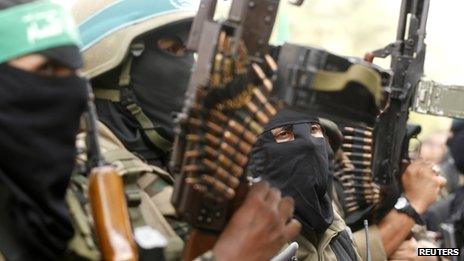Gaza crisis: Jeremy Bowen on a fragile ceasefire
- Published

In the last hours before a ceasefire, in a United Nations school in Gaza City that was packed with families who had fled from Israeli shelling, a girl of about 13 pushed a piece of cardboard torn from a biscuit wrapper into the hand of one my colleagues.
It was a checklist for the future, with one spelling mistake:
- I hope to stop a war
- I hope to live in a happy life
- I hope to be pace [at peace] for ever
- Happy dream
But this is Gaza, a place where nightmares can come true.
Her family had left its home near the border with Israel in a hurry, after Israel dropped thousands of leaflets warning them that they would be striking their neighbourhood. Not long after they left, the Israelis started bombing.
Does the ceasefire get the girl with the dream any closer to the life she wants? Probably not.
In the years since Israel pulled its troops and settlers out of Gaza in 2005, there have been many episodes of cross-border killing.
They have all been followed by ceasefires, some tacit, some arranged by foreign diplomats. All have failed.
That is because Israel and Hamas, which took over internal control of Gaza in 2007, are in a state of perpetual war, sometimes cold, sometimes searingly hot. Hamas, which poses no serious threat to Israel's powerful military, has shown it is very hard to beat.
I know there are children on the other side of the border wire, in battered towns like Sderot, who have the same kinds of hopes as the Palestinian girl in the UN school.
Brief respite?
Adults on both sides are much more sceptical about the future.
As he announced Israel's agreement to the ceasefire, Israel's Prime Minister Benjamin Netanyahu told Israelis he knew some of them had been expecting harsher military measures to be taken, and said they might still be necessary in the future.
A poll conducted for Channel 2 News in Israel, published just before the ceasefire went into force, said that 70% of Israelis were against it.
In a hospital in Gaza, a man in his early 30s, with a bandage round a head wound and shrapnel wounds to his chest, did not think it would make any difference in anything but the short-term.
"The Jewish people do not want a ceasefire and it won't work with them at all… There won't be a huge difference, with or without a truce."
In Cairo, the political leader of Hamas, Khaled Meshaal, declared victory.
"God has forced the hands of the Zionists to stop hitting our people in Gaza and they have submitted to our conditions."
Mr Netanayhu's officials, on the other hand, say Israel has caused Hamas real damage and taught it a lesson that reinforces Israel's capacity to deter its enemies.
Fragile understandings
If anything, the ceasefire is a draw. It suits both Israel and Hamas. They can both claim to have reinforced their positions.
But history shows that a ceasefire that does not buy time for a political process to address the festering problems of the conflict between Israel and the Palestinians will not last.
This time, the ceasefire comes with a page of written "understandings" that address some of the big issues between them. Palestinians are supposed to stop firing into Israel. Israel is supposed to open the crossings into Gaza and to facilitate the movement of people and the transfer of goods.
Stopping rocket fire and lifting the blockade are factors that could, if they happened, make a real improvement to peoples' lives and even restore some hope in the future among adults as well as children.
But Israel has said many times that the blockade is vital for its security, and even if Hamas enforces the ceasefire among its own fighters, it might struggle to control smaller and more militant armed groups in Gaza.
Barring a political miracle, the conditions for the next spiral that turns tension into violence are, sadly, still there.
The new Egypt has earned the praise of the Americans for the role played by President Mohammed Mursi in arranging the ceasefire.
The Egyptian president, an ideological ally of Hamas, showed considerable pragmatism in making the deal. He does not need killing in Gaza to distract him from Egypt's colossal political and economic challenges.
The praise he has had from the White House will not hurt his relations with the International Monetary Fund, which is in the process of throwing Egypt an economic lifeline.
Shortly after the ceasefire came in, officials at the White House were briefing journalists that the understandings were fragile.
Palestinians and Israelis have a breathing space. Turning the ceasefire into more than that will take much more than either side seems prepared to give.